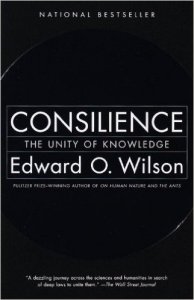 So now, after reading Edward O. Wilson’s The Meaning of Human Existence a bit over a year ago (last of five posts about it here), I’m returning nearly 20 years to one of his earlier, foundational I think, books: Consilience: The Unity of Knowledge, published in 1998, which I think I must have sampled a bit back then, but which for some reason never got around to reading through. (The cover of my first edition does not have any of the texts above or below those two lines that frame the title and author in this just-grabbed-from-Amazon cover image.)
So now, after reading Edward O. Wilson’s The Meaning of Human Existence a bit over a year ago (last of five posts about it here), I’m returning nearly 20 years to one of his earlier, foundational I think, books: Consilience: The Unity of Knowledge, published in 1998, which I think I must have sampled a bit back then, but which for some reason never got around to reading through. (The cover of my first edition does not have any of the texts above or below those two lines that frame the title and author in this just-grabbed-from-Amazon cover image.)
(In general, I am sifting through my library of several hundred nonfiction books on everything from cosmology to evolution to mind to complexity theory to religion to the future of humanity in space, volumes accumulated over the past 40 years, culling them down to the essential volumes that relate [not necessarily support] to the framework of my ‘provisional conclusions’, digging up long ago compiled notes about some of them, and reading for the first time some of those I’ve yet to closely visit.)
I’m now only about a third of the way through this book, but I think I’ll begin compiling summary, and quotes, as I go. Wilson included his idea of a ‘consilience’ between science and the humanities in The Meaning of Human Existence, and so I proceed with some apprehension in this earlier book that there is no new grand insight to be discovered, only detailed justification. So far I’ve found that, yes, but also elegant, insightful writing, and detailed examinations of the historical and scientific backgrounds that support his thesis.
The first chapter is brief, autobiographical. Wilson grew up in Alabama, a Southern Baptist, enamored of critters in the woods, especially ants, frogs, and snakes, and how the 18th century Swedish naturalist Linnaeus had come up with a classification scheme (still used, of course) for all life. Then in college his mentor gave him a book on evolution by Ernst Mayr — his 1942 book Systematics and Origin of Species [Amazon — everything is on the internet!] — and it was to Wilson a revelation, an epiphany. Suddenly everything made sense in new way. He’d experienced what he calls an “Ionian Enchantment”, the notion, going back to the early Greek philosopher Thales, that the world is orderly, and can be understood.
And Wilson found himself “released from the confinement of fundamentalist religion.” He’d been raised a Baptist, had been born again, had read the Bible twice.
But now at college, steroid-driven into moods of adolescent rebellion, I chose to doubt. I found it hard to accept that our deepest beliefs were set in stone by agricultural societies of the eastern Mediterranean more than two thousand years ago…
But most of all, Baptist theology made no provision for evolution. The biblical authors had missed the most important revelation of all! Could it be that they were not really privy to the thoughts of God? Might the pastors of my childhood, good and loving men though they were, be mistaken?
He drifts away from the church, yet:
I also retained a small measure of common sense. To wit, people must belong to a tribe; they yearn to have a purpose larger than themselves. We are obliged by the deepest drives of the human spirit to make ourselves more than animated dust, and we must have a story to tell about where we came from, and why we are here. Could Holy Writ be just the first literate attempt to explain the universe and make ourselves significant within it? Perhaps science is a continuation of new and better-tested ground to attain the same end. If so, then in that sense science is religion liberated and writ large.
Here in this paragraph he displays more wisdom than any number of authors of crude atheistic critiques of religion (as I described them a couple posts ago), who think pointing out the lack of evidence for implausible supernatural claims should persuade people to abandon their faiths. It doesn’t work that way.
He concludes this introductory, autobiographical, chapter, with an evocation of Daedalus, and quotes Eddington: “Let us see how high we can fly before the sun melts the wax on our wings”.
Subsequent chapters include a fascinating history of The Enlightenment, and how it failed, and much insight into how science, and scientists, works.





